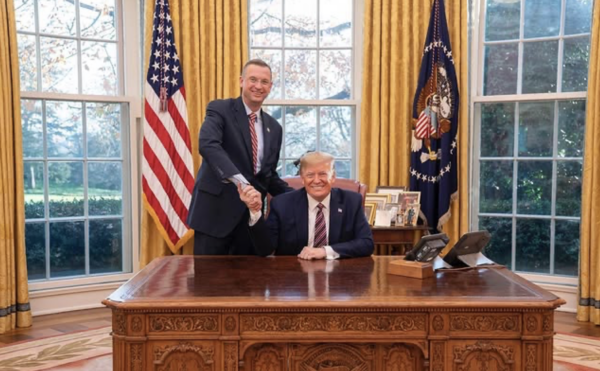
Georgia Congressman Doug Collins and President Donald J. Trump in the Oval Office, 2020 (Photo: repdougcollins)
President Donald Trump has named former Georgia congressman Doug Collins as his choice for VA Secretary, a candidate with both legislative experience and a military background.
Collins, 58, had not been widely speculated as a contender for the role, a surprise to many in the Veterans’ community when the announcement was made on Thursday.
Collins, who served in the House of Representatives from 2013 to 2021, held influential positions such as Vice Chairman of the House Republican Conference and member of the House Rules Committee. His military background includes active-duty service as a Navy chaplain and re-enlistment in the Air Force Reserve following the September 11, 2001, terrorist attacks. He deployed to Iraq in 2008 as part of the 94th Airlift Wing and continues to serve in the Reserve.
During his confirmation hearing before the Senate Veterans Affairs Committee on Tuesday, Collins pledged to prioritize Veterans’ needs and improve the VA’s efficiency.
“When you’re in the military, it’s about the mission. For me, if I’m confirmed, the VA will be my mission,” Collins stated.
He emphasized accountability and a commitment to ensuring that Veterans receive the benefits they deserve. Collins also addressed several pressing issues, including the future of VA health care. He voiced support for expanding Veterans’ access to private medical care while maintaining the VA’s health care system to modernize services without dismantling core functions.
“Veterans will always be able to use the health care system. The issue is how we make it better,” he said.
One controversial topic discussed was the VA’s 2022 rule, enacted under the Biden administration, permitting abortions in cases of rape, incest, or risks to the mother’s health. Collins expressed a need to review the rule under a 1992 law that prohibits VA-provided abortions.
“It’s time for us to take a look at the rule and ensure we’re following the law and the intent of Congress,” he stated.
Collins outlined plans to address the VA’s stalled $16 billion electronic health records overhaul and improve outreach to vulnerable Veterans, including those at risk of suicide or homelessness. While acknowledging the dedication of VA employees, he stressed the importance of accountability to improve the department’s operations.
The Senate committee’s questioning of Collins was thorough yet generally favorable, with members on either side of the aisle indicating support for his nomination. A committee vote is scheduled for Thursday, and, if confirmed, Collins could officially take over the role by February. In the meantime, Todd B. Hunter is serving as the acting VA Secretary.
In a social media statement, Collins thanked Trump for the opportunity and vowed to “fight tirelessly to streamline and cut regulations in the VA, root out corruption, and ensure every Veteran receives the benefits they’ve earned.” He added, “Together, we’ll make the VA work for those who fought for us. Time to deliver for our Veterans and give them the world-class care they deserve.”
Collins’ confirmation is expected to reignite debate over policies like community care, where federal funds are used to provide Veterans access to private-sector medical services. Currently, about 40% of VA health care appointments fall under this system. Collins expressed support for expanding such access to reduce wait times and travel burdens for Veterans, while balancing concerns about the potential impact on VA medical centers.
If Collins advances, all eyes will be on his approach to modernize VA services, allocate resources efficiently, and address the changing needs of Veterans. His ability to implement innovative solutions while respecting the core values and traditions of the VA will likely shape his effectiveness and define his legacy as VA Secretary.












